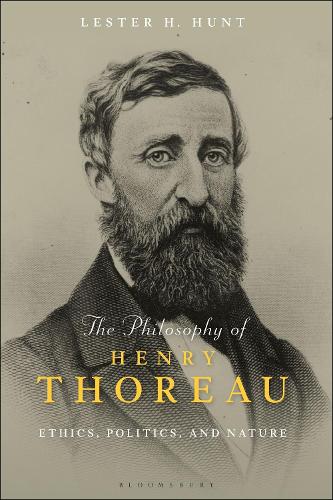
The Philosophy of Henry Thoreau: Ethics, Politics, and Nature
(Paperback)
Publishing Details
The Philosophy of Henry Thoreau: Ethics, Politics, and Nature
By (Author) Professor Lester H. Hunt
Bloomsbury Publishing PLC
Bloomsbury Academic
22nd April 2021
United Kingdom
Classifications
Tertiary Education
Non Fiction
Philosophy: aesthetics
Literary studies: c 1800 to c 1900
818.309
Physical Properties
Paperback
184
Width 156mm, Height 234mm
268g
Description
Henry Thoreau is widely considered to be one of the greatest nature writers, among whose best-known works are Walden and Walking. In this book, Lester Hunt shows that his writings have a compelling philosophical dimension as well. Thoreau seldom argues for his ideas the way other philosophers do. Rather than setting up proofs designed to trap the reader into agreeing with him, he challenges the reader by means of narratives, jokes, questions, and paradoxes -- to recognize possibilities previously unknown and unexplored. Thoreaus own explorations led him to several distinctively philosophical theories: an intuitionist metaethics, an ethics based on virtue and self-realization, a politics that is fundamentally individualist and anarchist, and a secular religion in which nature is pre-eminent.
Reviews
[The] book is carefully and logically argued. Hunt finds many widely recognized philosophical concepts in Thoreaus writings and makes a strong case that Thoreau deployed them consciously and consistently. Certainly, Hunt accomplishes his goal of showing that Thoreaus works constitute a coherent doctrine. * H-Environment *
The Philosophy of Henry Thoreau is arguably the best study of Thoreau in English which uses the toolkit of analytic philosophy. It deals with ethical and political issues of considerable importance. Hunt has convinced me that Thoreau was a far subtler and more rigorous thinker than I had ever imagined. * R. Kevin Hill, Associate Professor of Philosophy, Portland State University, USA *
Guided by the ideal of philosophy as transformative practice, Thoreau was an activist who believed in minding one's own business. Lester Hunt shows how he radically revised standard concepts such as possibility and necessity, putting forward his own terminology of nearness, economy, inward exploration, and deliberate attention to nature. Hunt capably situates Thoreau as a literary and philosophical author and a contemplative, explaining what his life and work mean for us today. * Rick Anthony Furtak, Associate Professor of Philosophy, Colorado College, USA *
Lester Hunt has written a book that says new things about Henry Thoreauno mean feat. The Philosophy of Henry Thoreau is a searching, well-written exploration of Thoreaus vitalistic, possibilistic ethics, well-informed by the history of philosophy while never losing sight of Thoreaus original contributions. * Philip Cafaro, Professor of Philosophy, Colorado State University, USA. *
Author Bio
Lester H. Hunt is Professor Emeritus of Philosophy at the University of Wisconsin-Madison, USA.
